Last updated on August 19th, 2024
Featured image: We can take control over our minds and bodies and enjoy travel during menopause / Photo by lucigerma on Envato
Menopause is a time to step into our potential
by Carolyn Ray
October is World Menopause Awareness Month, created in 2009 by the IMS (International Menopause Society) alongside the World Health Organization (WHO). World Menopause Day is held on October 18, 2023 to raise awareness of the menopause and the support options available for improving health and wellbeing during menopause, perimenopause and postmenopause.
Menopause is not a disease, rather, it’s a time of transition. Defined as a point in time 12 months after a woman’s last period, during the years before, women may have changes in their monthly cycles, hot flashes, or other symptoms. Every woman’s experience with menopause is different. Often, we suffer in silence and grit our teeth.
However, there is a positive side to menopause, but without talking about it, we don’t always see that it’s an opportunity to step into our next stage and reach our full potential. For midlife women, menopause is a time when we can make more conscious choices — and that includes the choice to travel for self-care. We have an opportunity to focus on us and nurture ourselves. With the number of menopausal women worldwide estimated to reach 1.1 billion by 2025, talking about menopause is important. Ninety per cent of women are menopausal by the age of 55-56, and many may stop their final menstrual period earlier.
10 tips to enjoy travel during menopause
When I invited women in the JourneyWoman community to share their stories about travel during menopause, several courageous women stepped forward. These tips are culled from their personal experiences. The advice provided here is based on our own experiences, so please consult with a medical professional before making changes or using supplements.
(Disclaimer: I am not a medical expert, nor are the women in this article. We’re merely sharing our stories and tips, so please consult a medical professional should you decide to pursue supplements or changes to your diet or other health care approaches and make sure you understand the risks.)
1. Nutrition – Fuel your body with high-quality foods
When you travel, wellness expert Shawna Robins recommends bringing a healthy fat like Ghee, and to look for high-protein snacks like avocado/ guacamole, hummus or high healthy fats like nuts and avocados or but butters or chia.
Robins says to look for higher quality foods (organic, grass-fed) and eat smaller portions. She also recommends usimg bone broth and collagen in your drinks or smoothies (like Ancient Nutrition) which helps with hair loss, skin and nails.Avoid sugar and processed foods. With changes in metabolism, smaller portion sizes might be a good idea. Try pushing breakfast and doing some intermittent fasting, not eating until 11 am when you’re hungry. For women who are iron deficient, consult with your doctor about an iron supplement. This will also help with energy levels.
“I’ve been adding bone broth and collagen powder and I need to strength train and keep myself stronger for long hikes and to do all the things I want to do when I travel. It’s so comforting – I sometimes make my own with carrots, lemon and garlic, and put it in jars. It’s a good, comforting drink.” — Ann Thompson
2. Reduce alcohol, especially at night
There’s nothing I love more than a glass of wine, but there can be (rather unfair) consequences to drinking, like night sweats. Night sweats occur because alcohol can affect the nervous system and how the body regulates and senses body temperature, blood pressure, and heart activity. Night sweats can also be caused by medications, thyroid conditions, autoimmune diseases, the flu, alcohol, spicy foods, anxiety, your cycle. If you get night swears, consider wearing pajamas made from breathable fabrics with moisture-wicking properties.
Do you have advice on menopause-friendly clothing? Send in your tips to [email protected] .
3. Reduce your stress and laugh more!
Many of us have been caregivers to others for years. Robins recommends learning how to say no to things, even when you’ve done them without complaint for years. Practice saying ‘I don’t feel like doing that.’ That can affect relationships around us – when you’ve always done something, it can create stress. ”Saying no is hard, but it gives us our life, our lifestyle and the quality time that we want. Where are we putting our energy?” she asks. Other ways to reduce stress include meditation, breathing and letting the small things go!
4. Get moving with exercise
Walking is so important to overall body health, particularly for post-menopausal women. Yoga is also wonderful.
Even more critical is building up bone density, so this might mean adding or shifting your exercise routine beyond cardio and into weight training to build muscle, especially over age 50. Find alternative ways to exercise. Bring resistance bands when you travel or do planks – try to work up to a one-minute plank!
Read our article on Getting Fit at Any Age here.
5. Focus on quality sleep
A 2020 study, published in the Journal of the American Heart Association, found that women with worse overall sleep quality not only have a greater risk of heart disease but consume more of the added sugars associated with obesity and diabetes. Sobering findings, particularly in the pandemic era, where stress and worry have many of us reaching for unhealthy comfort food.
Robins recommends that women who travel during menopause take melatonin for the first few days of your trip, starting with the flight, eat meals at set times and don’t get up when you wake in the middle of the night. Read more of her tips on sleep on the road here. Some women in our Facebook group also recommend THC oil and edibles to help with sleeping.
“I require air conditioning in hot places, or a window I can open in not hot places. Even in Iceland, I had a window open at night. I think sleep is the #1 factor and I respect my need for a room that is quiet, cool, NOT shared, with my own private bathroom. Younger I could rough it, but I’m a princess now and I own it. I deserve the comfort I want!” — Nat Hagn
“To help to sleep I adopted an infusion of camomile with honey, sage, fennel seeds infusion help to relax and sleep, hot flashes persists under stress and conflictive situations, working out helps very much. I’m doing pretty good!” — Leila Lamara
“A friend of mine has found taking magnesium tablets has helped to alleviate her life-long migraines. I have found taking more than the recommended dose (2 tabs instead of 1) an hour before bed has helped with better sleep, any excess the body doesn’t use will be excreted, taking 3 will be even more effective but be aware will also have a laxative effect the following day. Also find gently smelling lavender essential oil from a small bottle helps with getting back to sleep during the night. After heavy periods & low iron all the way till menopause, leaving them behind was the biggest bonus!” — Christine Jamieson
Please note: this article includes Amazon and other affiliate links, but we only ever recommend items we think are relevant for you and we’ve tried ourselves that will benefit you on your travels). If you decide to purchase an item through one of these links, we will receive a small commission that doesn’t add any cost to the purchase of an item.)
Five Quick Menopause Packing Tips
1. Avoid products with endocrine disruptors. Many chemicals, both natural and man-made, may mimic or interfere with the body’s hormones, known as the endocrine system. Called endocrine disruptors, these chemicals are linked with developmental, reproductive, brain, immune, and other problems. Check this list from the Environmental Working Group to see which products contain endocrine disruptors.
2. Shampoos: Choose a shampoo without sulphates and parabens and hormone disrupters and fragrances. Libby recommends Upfront Cosmetics, which has travel-sized, sulphate-free shampoo bars. Each 65g bar replaces up to 3 bottles of liquid shampoo. (available on Well.ca here).
3. Moisturizers: Shawna recommends natural, plant-based oils like jojoba oil, nut oils, macadamia nut, and coconut oil. Jacquie recommends The One – Satya, an easy glide, refillable stick that delivers Satya’s holy grail, multi-purpose moisturizing formula that travels with you wherever you go.
4. Keep hot flashes at bay: “As a woman in perimenopause, when it comes to hot flashes and sleep, I wish that there was a magic bullet for it. I love sleeping with a fan on me or in a very cool room. It’s great for your sleep, it’s great for your health, and it’s actually great for your heart. I also like the white noise aspect of having a fan it really helps me sleep and stay asleep for seven hours.” Or, try a Chilly pad: “A Chilly Pad is like a cooling pad that you can sleep on at night. It’s really great.” — Shawna R. Find one here.
5. Sleep + Temperature: The Oura Ring shows you how much REM sleep you’re getting and tracks your body temperature. “I’ve been using an Oura ring as part of my wellness journey to understand my sleep patterns, body temperature and exercise goals. It tracks my heart rate and reminds me to move every hour.” — Carolyn R. Find it here.
6. You’re not alone – Talk to your girlfriends, daughters and partners
I grew up in a family that never talked about health and wellness, much less sex or periods. I know my late mother had a hysterectomy, but I don’t know why or when because she felt it was a personal issue. I’ve made it a practice to share as much as I can about my health with my daughter, who’s now 21. I want her to know what I’m going through and not feel like this is a taboo subject or something to be embarrassed about. When I’m having a bad day, I tell her how I’m feeling. Sometimes she witnesses my down days, and her gentle, empathic manner lifts me up.
Similarly, I had never discussed my fibroids with girlfriends until a few years ago and was pleasantly surprised to discover we had the same challenges. Just knowing I’m not alone makes an enormous difference for me. I also laughed my head off at our shared stories – what a wonderful feeling!
Menopause puts our libidos under a microscope too. I’d like to think a happy sex life has more to do with how healthy you are, not how old you are. As Kavita noted, talking with your partner can be a game-changer and open new levels of trust.
7. Pack lightweight clothing, which also lightens your carryon!
You never know when a hot flash will strike, so pack lightweight cotton that can be worn in layers. Cathy recommends flowy sundresses (no jeans!) to her guests when she’s in Bali. Kavita finds socks hot, so tends to wear sandals. Ann likes the breathable cotton Soma brand at Chicos.
Cathy recommends bringing at least three bras when travelling so that you can wash and dry them out. In warmer climates, it takes longer for bras to air dry. Over the pandemic, I’ve moved away from wire bras and now wear only cotton bras. Check out our bras feature for advice from women on which ones to try.
8. Bring a self-care kit when you travel
When visiting a humid climate, Cathy recommends small facecloths that you can soak and carry in a bag. She also recommends a portable hand-held fan, which can fit in almost any size day bag.
“By day three, they realize it’s a practical item, due to the humidity in Bali”. Other women wear bandanas that you can soak in water.
Having extra menstrual supplies is important too – you never know when your period might start! Several women in our Facebook group also recommend using a Diva menstrual cup, a small, funnel-shaped reusable cup made of rubber or silicone that you insert into your vagina to catch and collect period fluid. Cups can hold more blood than other methods, leading many women to use them as an eco-friendly alternative to tampons. And depending on your flow, you can wear a cup for up to 12 hours.
9. Look into Hormone Replacement Therapy (HRT)
I’m not an expert on this, but my understanding is that bioidenticals hormones duplicate the structure of our hormones as they are found in our bodies. They are absorbed into the skin and can help with vaginal dryness, hair loss and muscle tone. Testosterone also comes in a cream and can reportedly help with libido.
“Bioidentical Hormones got me through beginning at 52. Still taking them at 72! Medical doctors don’t really approve of them. They just ignore bio-identical hormones when you tell them you are taking them Only the natural docs believe in them strongly. Start with progesterone to control hot flashes. Helps with sleep. Then move to Bi-Est estrogen. There are three types of estrogens. When you hit menopause you don’t need the ‘baby’ estrogen any more… Read up on all of this. It’s up to you the ‘quality of life’ you want by taking bio-identical hormones !!” — Janey Cruise
“ Next month will be my first fully menopausal trip. I probably have the opposite problem than most. After 10 menstruation-free years (the result of a hormonal implant which was prescribed to control my debilitating menstrual migraines), I am now on HRT which has been a godsend – but my periods have started again! And I’ve just worked out the calendar and – yes, I’ll be dealing with tampons in airplane restrooms. That used to be just month-to-month reality but now it seems like a big deal – especially as, germaphobe as I’ve become, I want to spend as little time in the bathrooms as possible. It seems silly not to have expected that HRT would bring my periods back, but that is just not something that people seem to discuss.” – Sally Smith
10. Be kind to yourself
Oscar Wilde wrote: “To love oneself is the beginning of a life-long romance.” Let’s take this time to love ourselves again. Let’s practice compassion, embrace self-care and fall in love with our new selves. Have that hot bath. Take a day off. Settle into a book. If we don’t, who will?
Resources
World Menopause Day is October 18, 2023 :Since 2009, the International Menopause Society (IMS), in collaboration with the World Health Organization (WHO), has designated October as World Menopause Awareness Month, with October 18 celebrated as World Menopause Awareness Day.
World Menstruation Day is on May 28, 2022. You can support Days for Girls Canada, a non-profit organization that sews and distributes sustainable menstrual kits to girls, women & menstruators worldwide. World MH Day was chosen to be on the 28th day of the 5th month in the year, as it represents the 5 flow days in a 28-day menstrual cycle. More here.
Period Poverty: In October, I walked the Camino in support of period poverty with donations going to The Period Purse. You can learn more here.
Books Recommended by JourneyWomen
Menopause Manifesto by Dr. Jen Gunter
The Vagina Bible by Dr. Jen Gunter
The Wisdom of Menopause by Dr. Christiane Northrup
A New Way to Age by Suzanne Somers
Powerful Sleep: Rest Deeply, Repair Your Brain and Restore Your Life by Shawna Robins
More on Health and Wellness
When Something Goes Wrong: What to Do if You’re Injured While Travelling
Anything can happen on a vacation. Here are some first-hand tips for women to plan for an unexpected injury.
Alcohol-Free Travel: A Different (and Healthier) Kind of Journey
With the growth of de-alcoholized beers, mocktails and sparkling wine, there’s never been a better to time to try alcohol-free travel.
Menopause Travel Packing List for Women Over 50
Our needs change during menopause; these women-recommended products will help women stay cool and comfortable during travel.

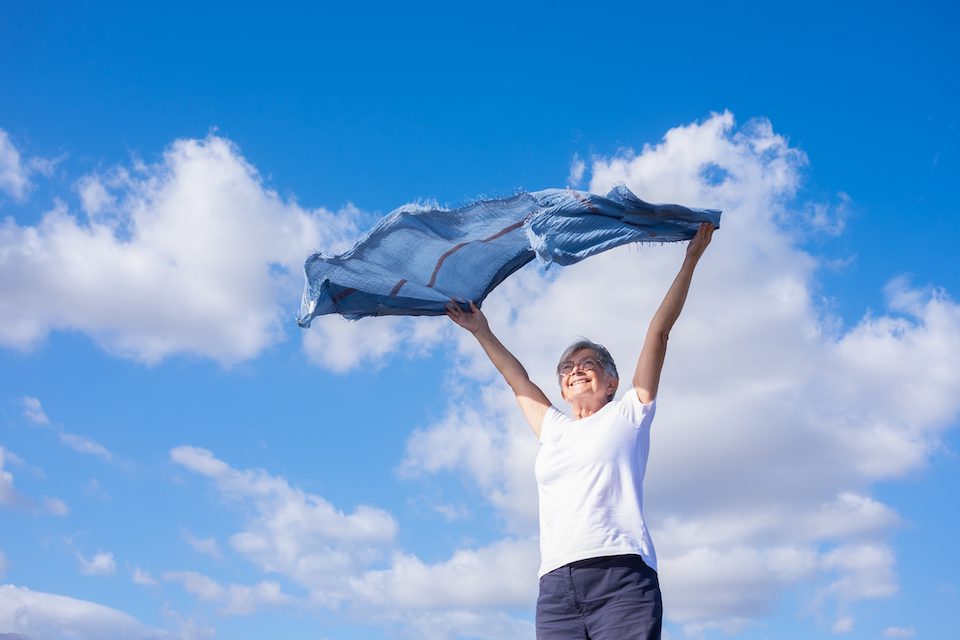

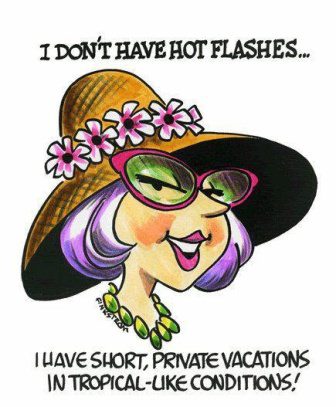
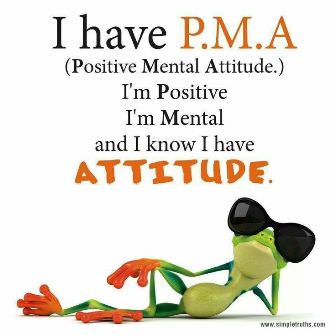
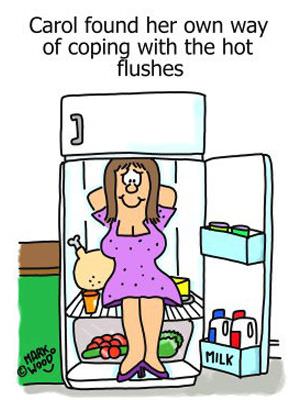
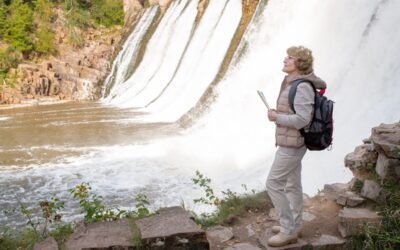
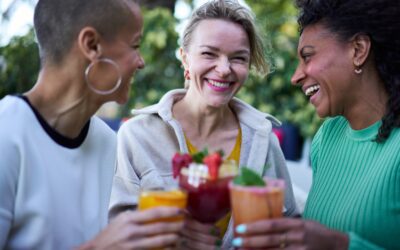
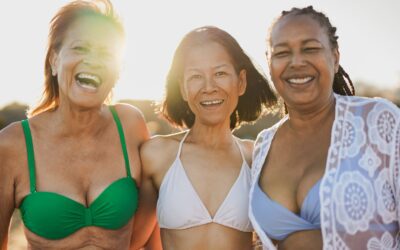
I keep Avene Eau Thermale – thermal spring water in a spray – in my fridge and carry in my purse and take two when I travel – one in checked and one in my purse – 50 ml size. Helps to cool and refresh face and eyes. Many gynecologists are doing blood work and dispensing bio-identical hormones. Some doctors promote “integrative medicine” in their practice and some naturopaths do as well. Progesterone is a must to calm and reduce flashes and you want the natural, plant based products. My migraines stopped after menopause.